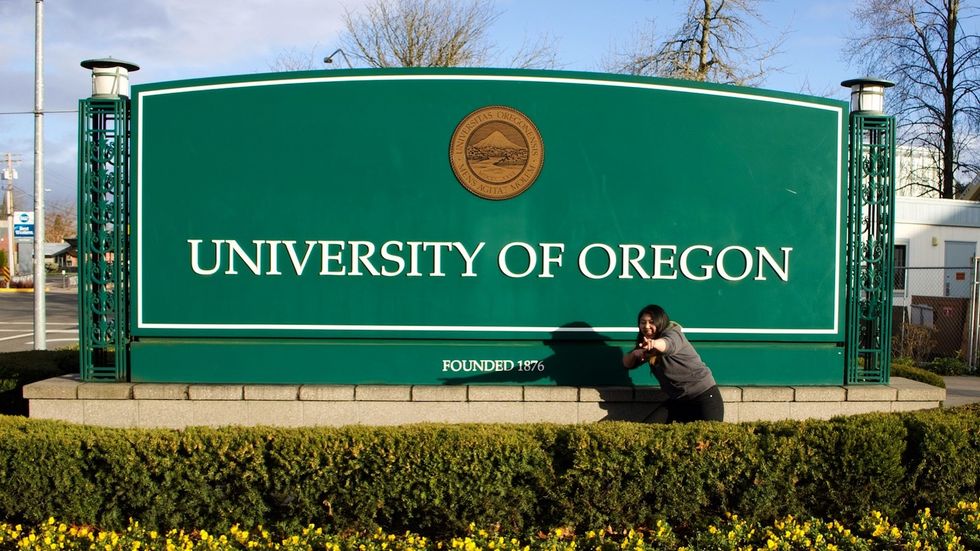In 1859, Oregon was granted statehood. It was the only state in the Union that was admitted with a constitution forbidding black people from the state. They could live, work, or own property. It was illegal for black people to even move to Oregon up until 1926.
On May 19th, 2014, in response to US Federal Judge Michael McShane’s ruling that Oregon’s state ban on same-sex marriage was unconstitutional, Equality California tweeted out, “Congrats on getting to the end of the marriage trail, Oregon,” with imagery taken from the classic game "Oregon Trail."
The game, which was created in order to educate America’s youth about the makings of American history, tells of the journey taken by Euro-American settlers across the United States during America’s Manifest Destiny phase. The player started as a wagon leader making their way from Independence, Missouri to Oregon’s Willamette Valley.
Many people don’t realize the extent to which Oregon history contains the mistreatment of minority groups. This is largely in part due to the fact that the sole focus of much of the attention that Oregon gets is focused on Portland and Oregon’s state universities, and what little information they were taught as a child when playing "Oregon Trail." While the "Oregon Trail" game does a great job of teaching America’s youth about the struggles that Euro-American settlers faced, it does nothing to educate about the various indigenous groups that were slaughtered and removed from their homes in order to found Oregon as a white utopia.
The same can be said about Portland and the state universities’ propensity for boasting about their amazing diversity. These claims, while not completely dishonest, completely disregard Oregon’s history as a white state.
Not only that but with using the University of Oregon as a specific example, their claims of diversity leaves out the fact that after protests calling for the renaming of Deady Hall started in fall of 2015, it took the university three years to decide not to rename it. Deady Hall is the oldest building on the UO campus and was named after a founder of the university who was a known to support slavery in Oregon’s constitution.
Fortunately, the university agreed to rename Dunn Hall, which was named after UO professor Frederick Dunn who was a known Ku Klux Klan member, Unthank hall in honor of DeNorval Unthank Jr., the first black man to graduate from UO with a degree in architecture.
These moments of history remain largely unknown to most residents and visitors of Oregon and are only known by those at the University of Oregon due to the fact that these issues concerning Deady and Dunn Halls have only recently been resolved.
A lack of visibility and accountability are key parts of why there are so many people in our country that have believed issues of race to be a thing of the past. The ugliness happening around the country in recent years regarding race, gender, and religious identities shouldn’t have blindsided too many people. It has been happening throughout our history as a country.
While the "Oregon Trail" game disregarding the mistreatment of indigenous peoples is a huge issue, another issue regarding its use as a celebration of marriage equality is the implication that achieving marriage equality is a final destination for the LGBTQIA+ community.
The LGBTQIA+ community has not achieved its end destination. Marriage equality has not magically cured the US, let alone the world, of its issues regarding gender and sexuality. This imagery disregards the fact that they are still dealing with issues of gender and sexuality-based violence and the pervasive influence of anti-queer religious views in politics.
The University of Oregon itself has done well create safe spaces for members of the queer community that go to school here. However, there is still fear among the community. This has been especially relevant ever since the 2016 election.
For a campus known to be as liberal as University of Oregon's, there is still a good amount of the population that has strong views against those who identify as queer or students of color. I remember distinctly instances of white supremacists on campus and hearing a variety of slurs said out loud in public spaces on campus.
Our nation may have improved, but the ugliness has never stopped. Until minorities can walk around without the fear of harassment, there is still work to do. Ignoring our history only proves to perpetuate a cycle in which gender, race, and sexuality-based violence occurs and is swept under the rug only to be repeated again later.
These parts of American history deserve and need to be acknowledged if we want a future we can look forward to.



















